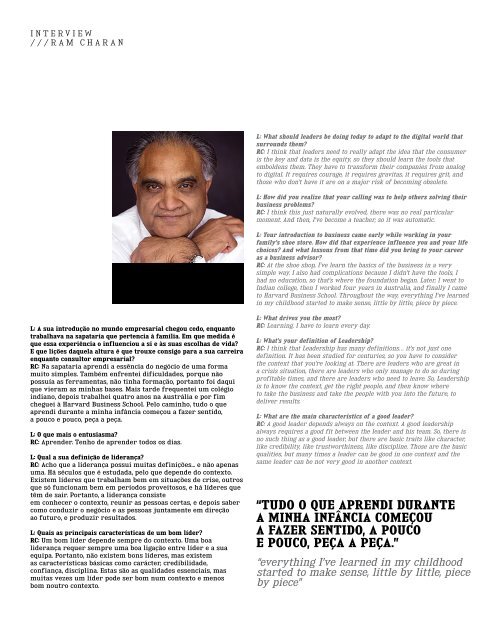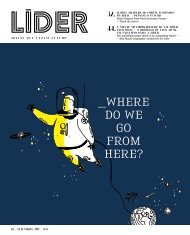Revista Líder – Setembro(2017) Nº1 Pago
Create successful ePaper yourself
Turn your PDF publications into a flip-book with our unique Google optimized e-Paper software.
Interview<br />
///Ram Charan<br />
L: What should leaders be doing today to adapt to the digital world that<br />
surrounds them?<br />
RC: I think that leaders need to really adapt the idea that the consumer<br />
is the key and data is the equity, so they should learn the tools that<br />
emboldens them. They have to transform their companies from analog<br />
to digital. It requires courage, it requires gravitas, it requires grit, and<br />
those who don’t have it are on a major risk of becoming obsolete.<br />
L: How did you realize that your calling was to help others solving their<br />
business problems?<br />
RC: I think this just naturally evolved, there was no real particular<br />
moment. And then, I’ve become a teacher, so it was automatic.<br />
L: Your introduction to business came early while working in your<br />
family’s shoe store. How did that experience influence you and your life<br />
choices? And what lessons from that time did you bring to your career<br />
as a business advisor?<br />
RC: At the shoe shop, I’ve learn the basics of the business in a very<br />
simple way. I also had complications because I didn’t have the tools, I<br />
had no education, so that’s where the foundation began. Later, I went to<br />
Indian college, then I worked four years in Australia, and finally I came<br />
to Harvard Business School. Throughout the way, everything I’ve learned<br />
in my childhood started to make sense, little by little, piece by piece.<br />
L: A sua introdução no mundo empresarial chegou cedo, enquanto<br />
trabalhava na sapataria que pertencia à família. Em que medida é<br />
que essa experiência o influenciou a si e às suas escolhas de vida?<br />
E que lições daquela altura é que trouxe consigo para a sua carreira<br />
enquanto consultor empresarial?<br />
RC: Na sapataria aprendi a essência do negócio de uma forma<br />
muito simples. Também enfrentei dificuldades, porque não<br />
possuía as ferramentas, não tinha formação, portanto foi daqui<br />
que vieram as minhas bases. Mais tarde frequentei um colégio<br />
indiano, depois trabalhei quatro anos na Austrália e por fim<br />
cheguei à Harvard Business School. Pelo caminho, tudo o que<br />
aprendi durante a minha infância começou a fazer sentido,<br />
a pouco e pouco, peça a peça.<br />
L: O que mais o entusiasma?<br />
RC: Aprender. Tenho de aprender todos os dias.<br />
L: Qual a sua definição de liderança?<br />
RC: Acho que a liderança possui muitas definições... e não apenas<br />
uma. Há séculos que é estudada, pelo que depende do contexto.<br />
Existem líderes que trabalham bem em situações de crise, outros<br />
que só funcionam bem em períodos proveitosos, e há líderes que<br />
têm de sair. Portanto, a liderança consiste<br />
em conhecer o contexto, reunir as pessoas certas, e depois saber<br />
como conduzir o negócio e as pessoas juntamente em direção<br />
ao futuro, e produzir resultados.<br />
L: Quais as principais características de um bom líder?<br />
RC: Um bom líder depende sempre do contexto. Uma boa<br />
liderança requer sempre uma boa ligação entre líder e a sua<br />
equipa. Portanto, não existem bons líderes, mas existem<br />
as características básicas como carácter, credibilidade,<br />
confiança, disciplina. Estas são as qualidades essenciais, mas<br />
muitas vezes um líder pode ser bom num contexto e menos<br />
bom noutro contexto.<br />
L: What drives you the most?<br />
RC: Learning. I have to learn every day.<br />
L: What’s your definition of Leadership?<br />
RC: I think that Leadership has many definitions… it’s not just one<br />
definition. It has been studied for centuries, so you have to consider<br />
the context that you’re looking at. There are leaders who are great in<br />
a crisis situation, there are leaders who only manage to do so during<br />
profitable times, and there are leaders who need to leave. So, Leadership<br />
is to know the context, get the right people, and then know where<br />
to take the business and take the people with you into the future, to<br />
deliver results.<br />
L: What are the main characteristics of a good leader?<br />
RC: A good leader depends always on the context. A good leadership<br />
always requires a good fit between the leader and his team. So, there is<br />
no such thing as a good leader, but there are basic traits like character,<br />
like credibility, like trustworthiness, like discipline. Those are the basic<br />
qualities, but many times a leader can be good in one context and the<br />
same leader can be not very good in another context.<br />
“tudo o que aprendi durante<br />
a minha infância começou<br />
a fazer sentido, a pouco<br />
e pouco, peça a peça.”<br />
“everything I’ve learned in my childhood<br />
started to make sense, little by little, piece<br />
by piece”<br />
LIDER ideias que fazem futuro /31



